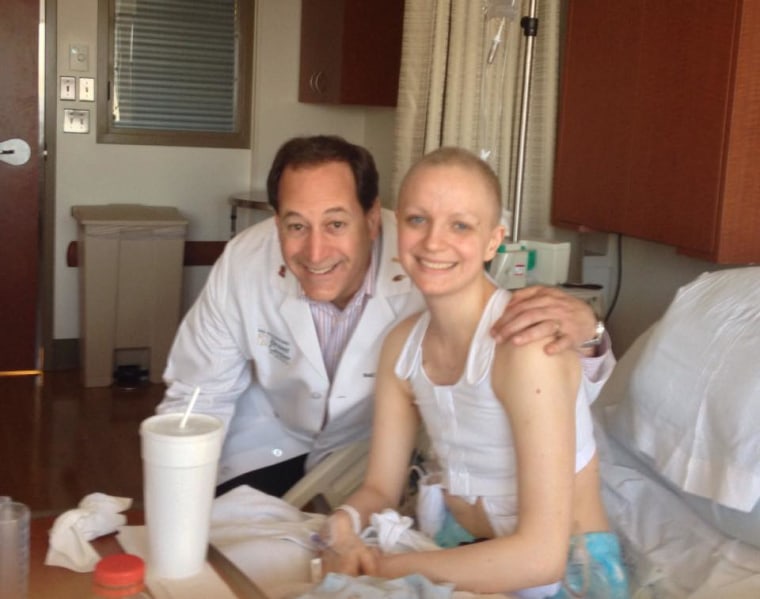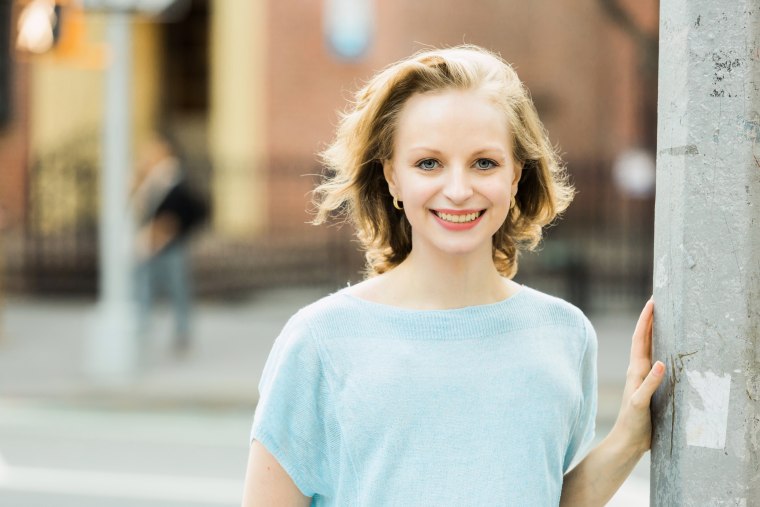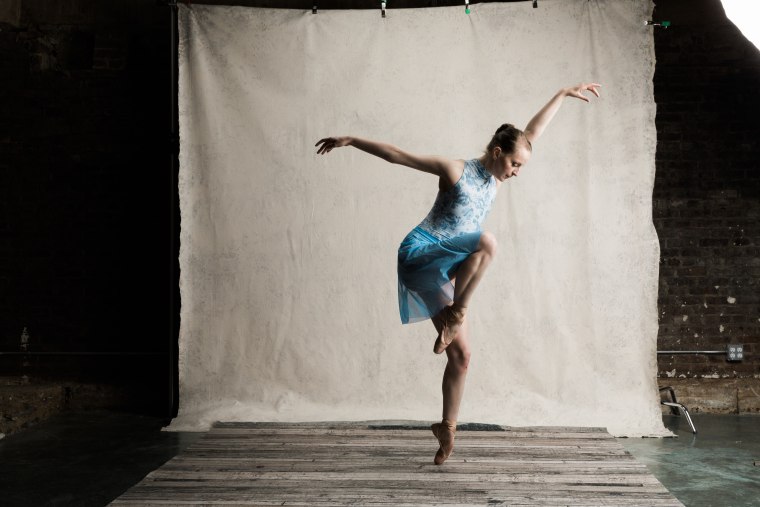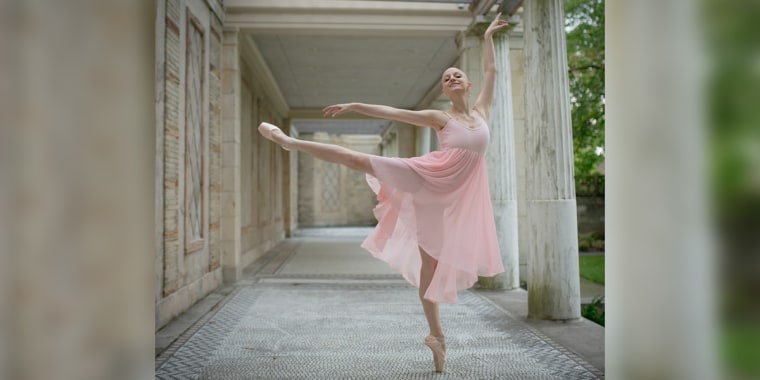Maggie Kudirka was a promising 23-year-old dancer with the Joffrey Concert Group in New York City in 2014 when she noticed a pea-sized lump in her armpit.
Kudirka initially shrugged off the discovery as a dance injury or fatty tissue left over from a breast reduction surgery she had five years earlier. She kept “dancing through the pain” until the lump was plainly visible and the discomfort “was so intense I couldn’t get out of bed without help.”
Doctors didn’t believe there could be anything seriously wrong with an otherwise healthy young woman without a family history of breast cancer. She struggled to schedule appointments with multiple doctors for an evaluation. Finally, a nurse listened to her and urged her to request testing. Still, Kudirka had to push for a biopsy and then a second opinion.
Four months after noticing the lump, she was ultimately diagnosed with stage 4 metastatic breast cancer that had spread to her sternum, spine, hips, femur and lymph nodes. She went from not being able to get a doctor to take her issue seriously to daily hospital tests and chemotherapy.
With that diagnosis, Kudirka’s world changed. She had to trade her vision of a future filled with curtsies and costumes to one filled with medication and hospital visits. Her summer with her family where she grew up in Ellicott City, Maryland became a permanent move in order to maintain the support and treatments to keep her alive.

“The days and months after my diagnosis were a blur,” said Kudirka. “I really tried to rest after my chemo and not push my body too much because I knew I needed to let it heal and take in the chemo drugs.” Taking it easy was harder than it seemed; Kudirka was used to being busy, so having an empty schedule didn’t put her mind at ease.
It wasn’t until a year after her diagnosis that Kudirka experienced depression. Her friend’s mother, who was diagnosed with breast cancer just before Kudirka, passed away. “Experiencing her passing was really tough for me. It was really the first time I knew someone who passed away from metastatic breast cancer,” Kudirka said.
Kudirka has undergone a double mastectomy, six initial rounds of chemo and monthly infusions or injections. She also takes daily pills to slow the progression of her cancer. “I'm never out of treatment. I'm never considered cured. I’m never considered in remission. The most I’m considered is ‘no evidence of active disease’,” said Kudirka, now 29. “There's no point of having that day to ring the bell or just celebrate that I'm cancer free. That day probably won't come for a very long time…until a cure is found.”

Despite the terminal diagnosis, Kudirka has found joy in dancing and connecting with her social media audience through her “bald ballerina” account. Currently, her days are filled with Zoom calls, meetings and events as she continues to share her story and spread awareness about cancer.
Kudirka—who just received her first dose of the Covid-19 vaccine—has also used her platform to encourage mask-wearing and provide resources for people who are living with cancer in the middle of a pandemic.
She’s currently working to find balance between keeping her body moving in the studio and recharging her mind on quiet days. And above all else, she is resilient.
Here is how she maintained strength while facing overwhelming obstacles:
“Keep busy.”
As someone who was used to incredibly busy days of classes and nights of performances, Kudirka knew that filling her time was essential to maintaining a positive attitude. She would find anything that sounded interesting—even things as simple as planning to go strawberry picking with her cousin—to keep moving.
“It helped because it prevented my mind from wandering and thinking: ‘How long do I really have to live? How will this treatment work? When are side effects going to kick in?’” she said.
“Do what you love.”
Even though she couldn’t continue dancing with the Joffrey, Kudirka tried to get into her Maryland studio as much as possible. She teaches dance twice a week locally, and in pre-pandemic times, she traveled all over the country to teach and judge dance competitions.
“Cancer doesn't take away your whole life. It's just a little part of it,” Kudirka said. “So as long as I was able to do what I loved, it helped me mentally because it told me that cancer didn't take everything away.”

“Share your journey.”
When she was first diagnosed with cancer, Kudirka was encouraged by a former professor to keep a blog, either just for herself or to share with friends and family, to record all of the milestones on her new journey.
And that’s how the Bald Ballerina social media platform was born.
Initially, Kudirka limited her online audience to friends and family—it was just a way to keep them informed of how she was doing without individually contacting each person. Eventually, she made her site public and transformed it into an education and advocacy page.
“Speak up.”
Before her diagnosis, Kudirka said she never knew that someone her age could be diagnosed with metastatic breast cancer. “I had no idea that people under 40 could get breast cancer; I just thought it was for older people.” Now, Kudirka says she gets several messages every few months from young women who received that same diagnosis.
To help reach an even larger audience, Kudirka recently joined the Leadership Council of The Pink Agenda, an organization that raises funds and increases the awareness of breast cancer among young professionals. She hopes that her platform educates young people to know what to look for and how to advocate for themselves in the medical system.
“It's important for women in college and just out of college to know that they can speak up for themselves and request tests. They don't have to necessarily listen to their doctor—they're hiring their doctor to take care of them. And if they feel like their treatments and their care aren't what they want, they can find a new doctor.”
“Take care of yourself.”
“Your health and your mental health is the most important thing you have to take care of. So make sure you're taking care of that every single day,” said Kudirka.
Whether you’re fighting cancer or hitting the pandemic wall, Kudirka recommended doing something you really enjoy, whether it’s snuggling your puppy or having a cup of coffee. And while you’re at it, get moving, even if it’s just a walk around your bedroom.
If you know someone going through tough times: “Show up.”
Kudirka often felt the love of people supporting her throughout her journey. One of the simplest and most memorable gestures she recalled was that her aunt and uncle used to make dinner and drop it off after her chemo treatments.
If you know someone who is struggling, Kudirka said, “Don’t ask what we need help with—we’re not going to tell you because we don’t know.” Instead, think about what you might need in the same situation, and “just show up and do it,” whether it might be dinner, grocery shopping, house cleaning or childcare.
Remember: “We need the tough times to have the good times.”
Kudirka found this reminder especially helpful in coping with the additional ups and downs of the Covid-19 pandemic on top of her regular treatments.
“Having a tough diagnosis or bad news means that in a little bit, whether it's a couple of days, a couple of months or a year, good times are coming. You'll be so grateful that you pushed through the tough times to get to that good time moment.”
